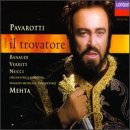| All Artists: Giuseppe Verdi, Zubin Mehta, Luciano Pavarotti, Antonella Banaudi, Maggio musicale Fiorentino, Leo Nucci, Shirley Verrett, Barbara Frittoli, Piero de Palma Title: Verdi - Il trovatore / Pavarotti, Banaudi, Verrett, Nucci, Maggio musicale Fiorentino, Mehta Members Wishing: 0 Total Copies: 0 Label: Decca Release Date: 10/17/1995 Genre: Classical Style: Opera & Classical Vocal Number of Discs: 2 SwapaCD Credits: 2 UPC: 028943069427 |
Search - Giuseppe Verdi, Zubin Mehta, Luciano Pavarotti :: Verdi - Il trovatore / Pavarotti, Banaudi, Verrett, Nucci, Maggio musicale Fiorentino, Mehta
 | Giuseppe Verdi, Zubin Mehta, Luciano Pavarotti Verdi - Il trovatore / Pavarotti, Banaudi, Verrett, Nucci, Maggio musicale Fiorentino, Mehta Genre: Classical
|
Larger Image |
CD Details |
CD ReviewsA Curiosity, But Not Horrible. Tracy L. Powell | Bangkok, Thailand | 02/06/2000 (3 out of 5 stars) "This recording made either during or after a string of live performances in Italy was a showcase for Luciano Pavarotti. And he does a pretty good job as Manrico. He was certainly not a young man anymore, but his voice still had the same distinctive beauty and ring. But he sounds like he just barely made it through the sustained high note at the end of "Di quella pira." I give Pavarotti 4 out of 5 stars. I had not heard of Antonella Banaudi (the Leonora) before this recording, and I haven't heard of her since. While her voice is attractive enough it sounds as though this role is just too much for her. Not to mention she can't handle the coloratura. I give a lot of credit to Leo Nucci's Count di Luna. He deserves more credit than he usually recieves. His voice is attractive and he sings this role with passion. Shirley Verrett does a great job as Azucena." Zubin Mehta understands Trovatore & Banaudi is discovered! Impostazione | New York City Area | 12/24/2006 (5 out of 5 stars) "Il Trovatore was written at a time when the atmosphere was more earthy than any living person has ever experienced. It was a challenging time but underscored by an ever present need for security, beauty, richness of spirit and autonomy. It was the conclusion of an era when people were profound enough to reflect on the injustices done to them and plot a course; sensible and practical, for their victory. They had learned cause and effect and that actions have consequences. Needless to say, this is VERY different from our world, where Forrest Gump type characters without background have been allowed in very important positions which have led to many horrible things; among them war, death, terror, a certain demise in art, culture, and appreciation of diverse forms of beauty. If Trovatore has lacked dignity it may be for these reasons.
Trovatore lacks essential action. It is mystical because the main drama unfolds as storytelling. That is possibly why Verdi inisisted on fast vigorous conducting, and accented, less connected words within phrases. This sustains the drama and interest. In this regard, Mehta is the most excellent conductor of Trovatore since Toscanini and Molajoli. The stage should always be sombre, particularly during Azucena's and Leonora's scenes, and the music projects the appropriate shade within its sonority. However, slow von Karajanesque conducting ruins the line of intensity and accent required to sustain interest in storytelling as the drama is third hand to the audience, second hand to the characters. Antonella Banaudi was possibly the very last soprano who brought authentic grandezza to the role of Leonora. Her singing at times recalls Anita Cerquetti and Gabriella Tucci (even a touch of early Price is thrown in). She was one of three promising divas to emerge in the 1980s & 90s which brought a grandness to Verdi's heroines. Aprile Millo ( similar to Tebaldi, Milanov, Caniglia) and Susan Dunn (similar to Price, Crespin, Rethberg) were the the other two, but whereas Dunn's blithe tones could match any voice of the past she was not authentic sul palcoscenico, and Millo, the most technically finished was a modern version of grandezza, sort of a copycat, a little self conscious, but both ladies were superb. Banaudi seemed unable to match the vocal finish of her two sisters, but her voice really had that authentic Italian sheen and on stage the purity of intention, her nobility of her movement; the smoothness of her gestures, the long graceful steps, the quick action so dignified is superiority itself and through this she was able to project a state of mind of the time -- and here her high C was an edgy powerful and historic note. Perhaps this, more than the voice, is what we lack today. Her type of acting is not "method", but a kind of "5 Movement" system validated by her intention. ANTONELLA BANAUDI WAS MADE FOR THE STAGE. Zubin Mehta really understands Il Trovatore. His rugged approach emphasizes accent and rhythm so essential to this work and he achieves a vivacity that would have pleased master Verdi if not the current milieu, which are soft core and hard hearted. When you throw in the High C's of Luciano Pavarotti, and dark colors of Verrett, and the stretched tones of Nucci, you will have a very authentic Trovatore; more real than beautiful and very engaging." |

 Track Listings (18) - Disc #1
Track Listings (18) - Disc #1